-
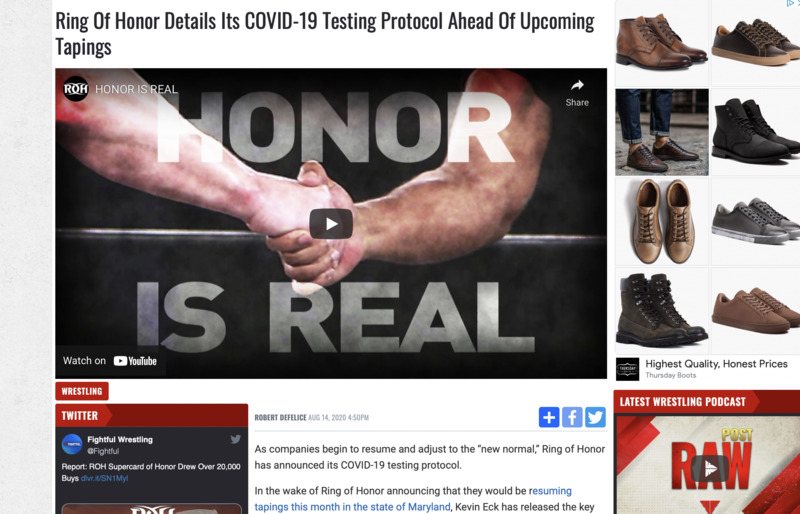
2020-08-14
Professional wrestling promotion Ring of Honor announced their intentions to resume production of their weekly televised wrestling show, but with no fans in attendance and COVID protocols for the staff. Like all live entertainment avenues, professional wrestling has also been affected by the pandemic and has had to take precautions to protect its staff, talent, and fans.
-
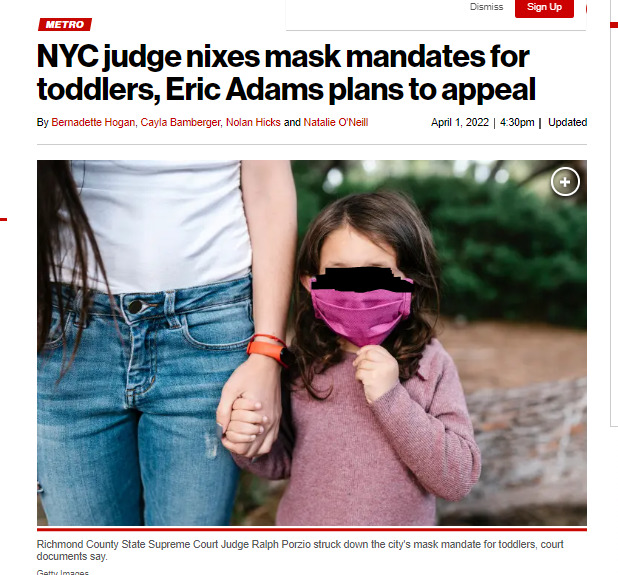
2022-04-01
This is a story by Bernadette Hogan, Cayla Bamberger, Nolan Hicks and Natalie O'Neill for the New York Post. This story is about masking for young kids and the struggle within the local government on what is best to do. A Staten Island judge ruled against masks for toddlers in New York City. Parents in support of this claim that this is a good thing because masks could make it harder for kids to socialize and read emotions. Eric Adams, the mayor of New York City, plans to appeal this to reinstate masks, where he believes that if you don't know the vaccination status of everyone in a room that you should wear a mask.
-
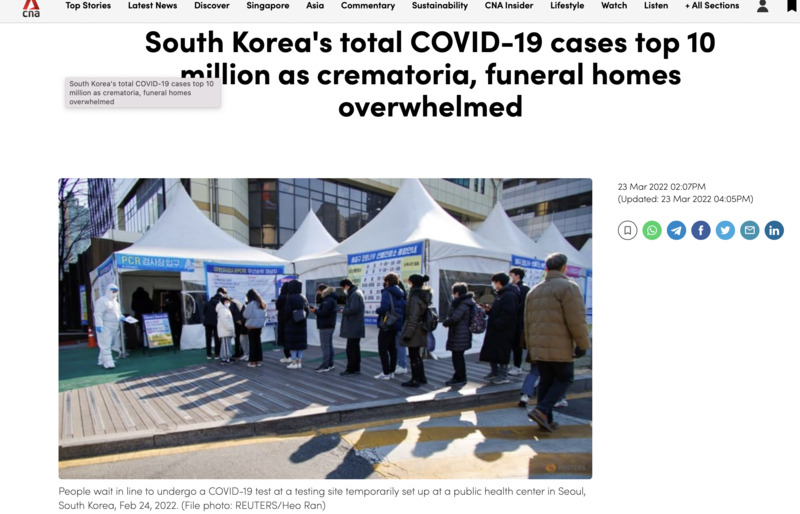
2022-03-23
This is a story by Channel News Asia about the ongoing issues with funeral homes in South Korea. This article says that in Seoul, 28 crematoria are operating at 114.2% capacity, while other crematoria around the country are operating at 83%. For the past two week, the number of critically ill patients has been hovering above 1,000; but it could get to 2,000 by early April. To combat this, the federal government has approved the use of Merck & Co's COVID-19 treatment pill. The pill is branded as Lageviro and is the second antiviral to be authorized in South Korea after Pfizer's Paxlovid. This pill, however, is only approved for adults 18 and above. The government is hoping that actions such as these will help limit the crowdedness in funeral homes and hospitals.
-
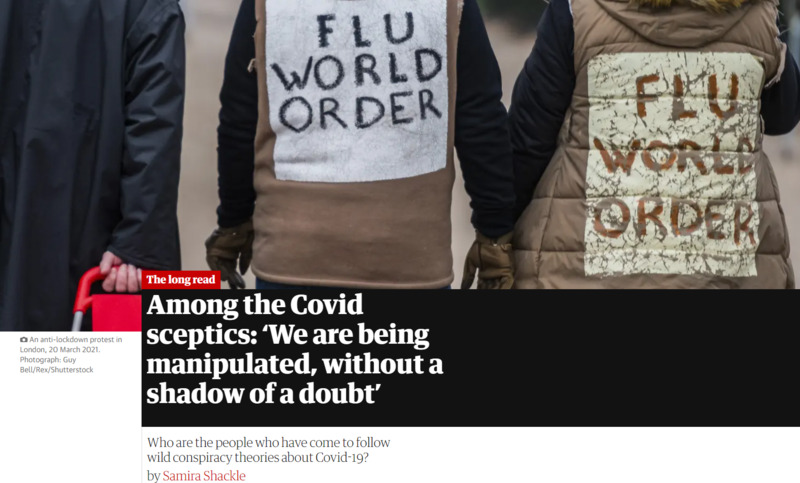
2021-04-08
I believe we all know someone during the worst days of the pandemic who doubted that it was as serious as it really was. Perhaps they willingly discussed their perspective, reluctantly talked about it if pressed, or just did not even want to talk about it. I am not talking about the people seen in the attached article that were out protesting masks or vaccines, pushing conspiracy theories on 5G and Bill Gates' love of vaccines. I am thinking of the people we work with, are friends with, or very likely are in our families that just really just wanted life back to normal and did not think the global reaction was justified.
A casual search of the internet for the perspectives of COVID doubters, or those who thought that the reaction to the pandemic was over-the-top, immediately sends you to articles and stories about the horrors and idiocy of the COVID deniers who pushed crazy theories about world dominance. Wouldn't it be nice to understand how the middle ground of the pandemic felt, lived, and reacted to the reality of the pandemic, if at all? We owe it to future generations to not only highlight the worst in the deniers, as seen in the attached article, but to also illustrate the everyday people who just were not sure who to believe, fake news or science. One thing is for sure, it is not fair to lump everyone in the middle into the far right. I would like to hear the stories of people who doubtfully lived in the pandemic, their trials, frustrations, and tribulations and if they had any change of heart or ideals. Their perspective will give a further understanding of the sociological impact of the pandemic.
-
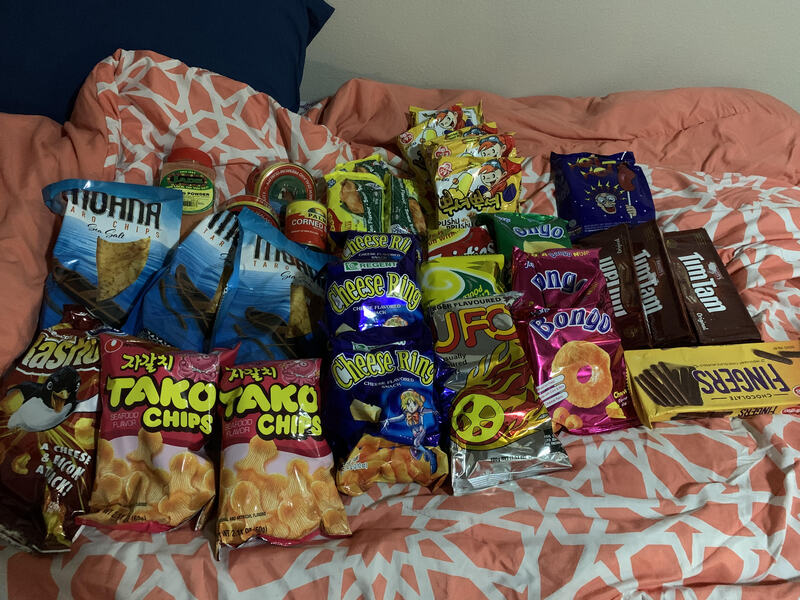
2020-12-14
Three years ago, COVID-19 barred many people from traveling back home, and my roommates and I were one of those people. We all came from American Samoa, and while we planned to return home for the summer, thanksgiving, and Christmas, we could not do that. I remember working a part-time job during school to save up just enough to pay for my roundtrip fare, but unfortunately, COVID changed that. Although we could not have the chance to return home for the holidays, our families made it possible to bring the taste of island snacks to St. George with the constant sending of care packages. The photo I uploaded showed one of the many care packages my family sent me from home, which meant a lot to me. My roommates and I were very homesick, but our families came through with the snacks from home. I remember eagerly checking and refreshing the USPS app to track my package. It became my favorite thing to do during the COVID shutdown.
-
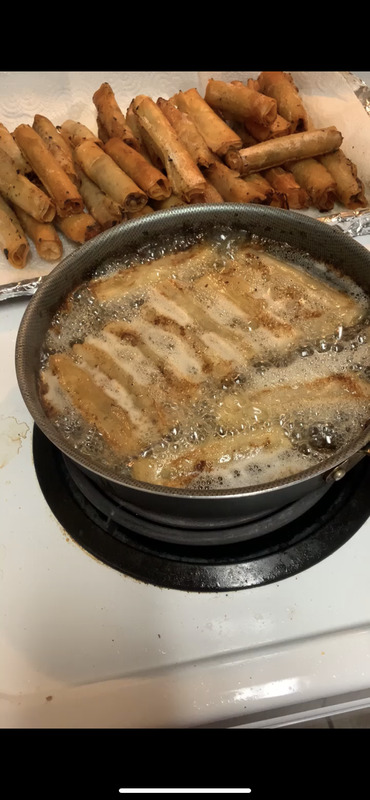
2020-12-10
This picture is when my roommates and I cooked lumpia in St. George, Utah, and classes were all moved online during the shutdown. We ended up with a lot of time on our hands during the shutdown, and we decided to cook and bake our favorite recipes, and lumpia was one of them. While COVID-19 changed our educational experience, it also changed our eating habits because we used to depend on ordering food a lot that we hardly used our shared kitchen in our dorm room together. This was one of my favorite memories with my roommates because, through food, we were able to spend more time preparing recipes, cooking them, and eating them together, unlike before. While COVID shut down everything, it gave us more time to bond together as roommates through food.
-
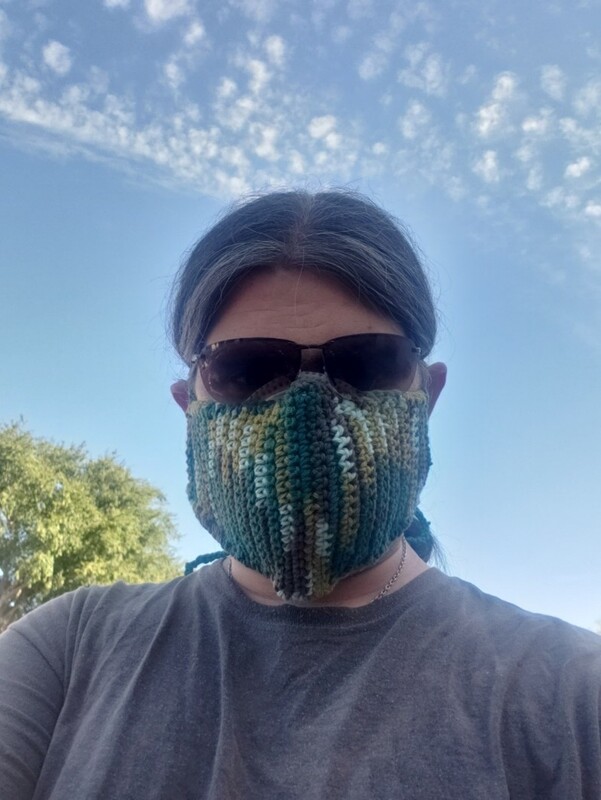
2022-04-01
One thing that really stands out to me when I look back on the past two years since the pandemic began is how much fear there was at the onset. I remember it being about mid-March of 2020 and schools had moved to online learning, all nonessential businesses were closed, and it was almost impossible to find even basic groceries. The overwhelming majority of people were wearing some sort of face covering at this point and just the act of going outside felt dangerous. I should point out that since I work in the aerospace and defense manufacturing sector I was classified as an essential worker without the possibility of working remotely. Given that all of my friends had jobs that had moved to remote work and could isolate in their homes I felt that it was too risky to be around them given that I was out every day. I think that it is interesting that this was the state of affairs when there were maybe 1000 confirmed cases in the state of Arizona at this point. When contrasted with the reality that there have now been a total of over 2 million confirmed cases with approximately 25,000 currently active cases and for the most part everyone is going on with life as normal, I am left wondering if the fear at the beginning was irrational or if the current sense of complacency is the result of a society worn down to the point of indifference?
-
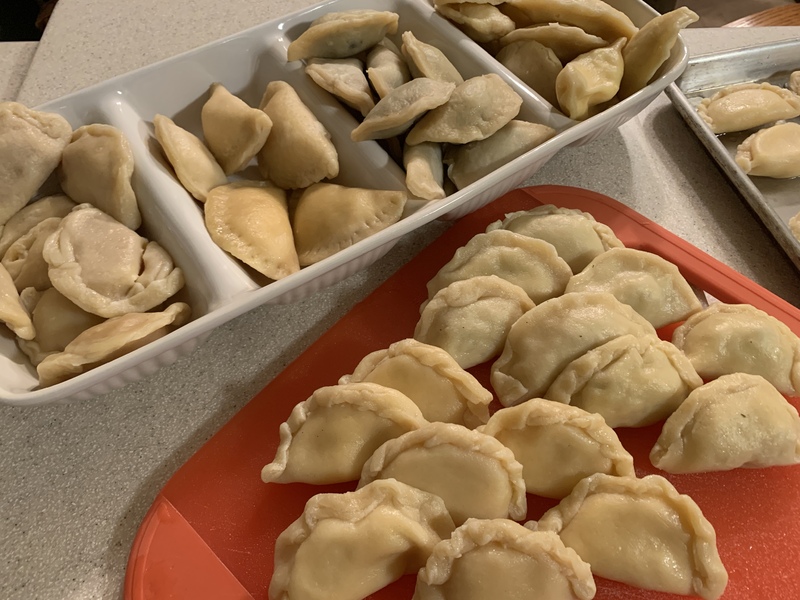
2020-12-25
The pandemic marked a turning point for my family. A few weeks before the March 2020 lockdown, my grandmother was hospitalized then placed in her final nursing home. Although my family knew the Alzheimers and cancer were progressing, we never expected a pandemic to make letting go even more difficult. Shortly after her arrival in the nursing home, the building closed down for all outside visitors. For the entire summer of 2020, my family and I had to watch grandma through a screened window. By the time we were finally able to go inside the nursing home to touch her again, it was only because her time was coming to an end. By then, my grandmother only recognized my grandfather, the rest of us were strangers.
My grandmother was in many ways the glue of our family. To lose her at a time when we could not see each other in person at holidays was extra difficult, but we adapted and even started new traditions. As a Polish family, we always have pierogi and fish on Christmas Eve and we usually purchased our pierogi from local churches that handmade the delicious dumplings every year. However with the pandemic, most churches did not sell pierogi in 2020 to protect their older community members who made the pierogi. Therefore, we decided to attempt for our first time to make our own pierogi from scratch. Admittedly, the pierogi we made in 2020 were not the best (and we made over 300 of them!), but we did not give up.
In December 2021, our families could once again gather in person – our first Christmas together without grandma. We made our own pierogi, and this time my cousins were able to join and help. Not only did the pierogi turn out much better in 2021, but a new tradition became cemented. Although the pandemic provided many hardships, I can't help but be thankful for the two years of stillness and uncertainty it provided. The pandemic allowed me to return to my hometown, reconnect with my family, and start a new chapter in my family's history. I think my grandma would be really proud of our new tradition.
-
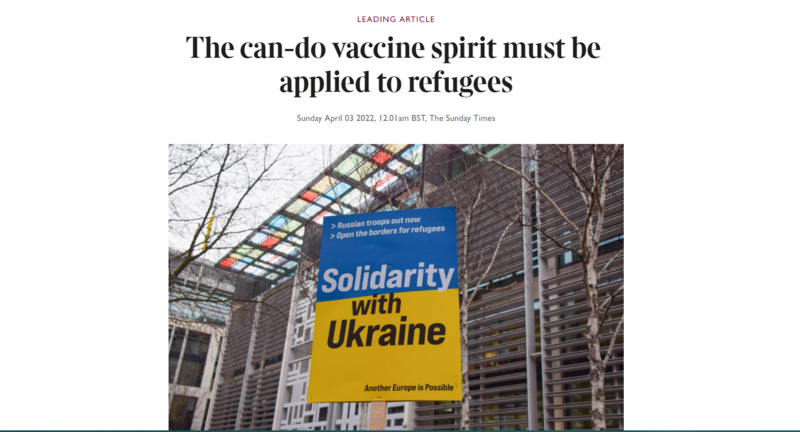
2022-04-03
This is a news story written by The Sunday Times (cannot find author). The Sunday Times is a British paper and this is detailing the contrast between the generosity of the British citizens towards Ukrainian refugees, but the lack of care from the British federal government. It says that over 200,000 people and organizations have registered to sponsor refugees in the Homes for Ukraine scheme. The overall story is not about the vaccines themselves, but the author is wishing for the can-do attitude of distributing vaccines in the UK to be applied to the refugees. Of the visas applied by refugees, for families, 32,300 applied for a scholarship, but only 4,700 were issued. I think that during the pandemic, the author that wrote this got more used to the government being lenient in helping, but now when faced with a refugee crisis, lacks that same helpful spirit.
-
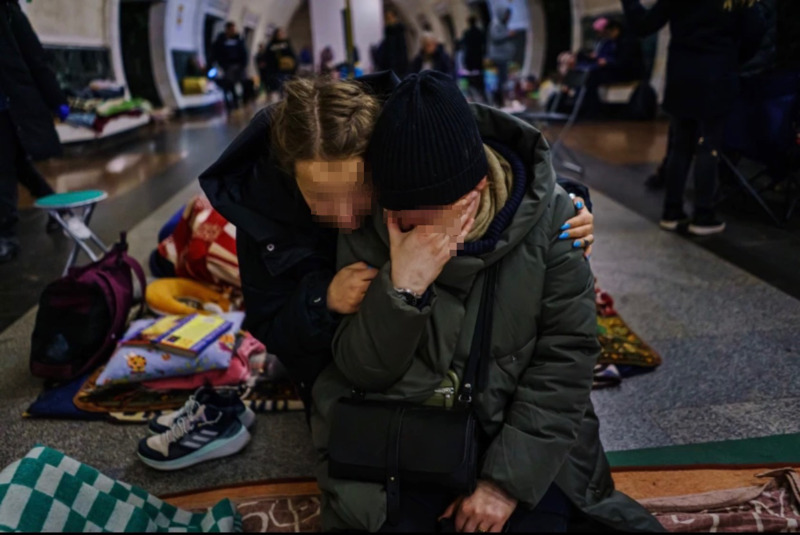
2022-03-26
This is a news story from the Los Angeles Times by Melissa Healy and Emily Baumgaertner. The authors claim that even prior to Russia's invasion of Ukraine that Russia has been working to undermine the confidence of Western vaccines. It says that these messages were encouraged by President Vladimir Putin and shown on Russian TV and social media. In Ukraine, only 35% of residents are fully vaccinated, some of the lowest in all of Europe. This makes the refugee crisis in Ukraine more dire, as people needing to leave will risk spreading COVID more places. The authors assert that with the low vaccination rates of Ukrainian refugees that it will cause another surge in COVID cases throughout Europe. The CDC has advised countries accepting refugees to offer them the vaccine upon entry. This article details that this is not the only vaccine that Ukrainians have not accepted as much compared to the rest of Europe. In 2021, only 53% of Ukrainian babies were vaccinated against polio. That number has now risen to 76% of infants being immunized against polio. Though, the likelihood of these diseases spreading as far as COVID are fairly low. The vaccine hesitancy, the authors say, is rooted in deep distrust of the government. In December 2020, only 14% of Ukrainians reported having trust in their government in a poll.
-
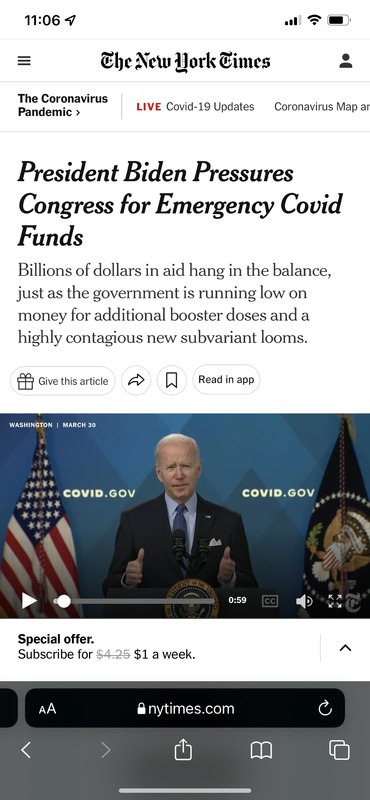
2022-03-30
This is a news story written by Sheryl Gay Stolberg, Emily Cochrane and Noah Weiland for the New York Times. The article writes of how President Biden believes this is not a partisan issue, but a matter of health. President Biden is said to have received his second COVID booster prior to making this announcement. Another aspect this story brings up is how BA. 2, a new COVID variant, has made itself known, raising concerns for once it gets to the United States. President Biden has made it known that as these new variants pop up, we will be in our "Next Normal", where masks and other such requirements will be used when needed. In other words, there is no real "end" to the pandemic.
-
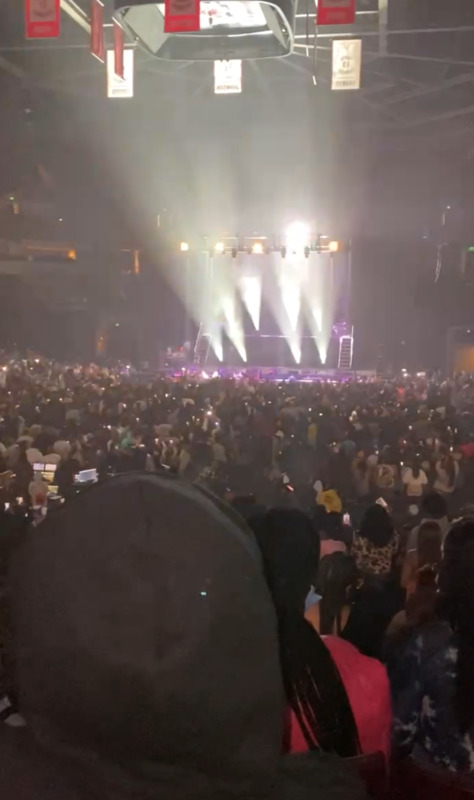
2022-01-14
Since the pandemic has commence, I haven't done many public outings or attended big events. This January, I had finally got enough of the courage to go to a concert for the first time in three years. Overall, I would argue that the outing was fun and safe, but I could not help but still feel anxious and scared of what was yet to come despite it being a good time. Part of this was because the concert did not require anyone to wear a mask, nor did that enforce social distancing with the seats like I thought they would. Most of this was because COVID-19 cases had started to climb down despite the onset of the new variant OMICRON at the time. I wore my mask regardless since we were sitting so close to people and still enjoyed myself despite these bypasses. I feel that this concert represents how I and other people felt confident enough to do big social outings again despite the pandemic still going on. I also feel like this concert illuminates how people still seek entertainment and enjoyment in their lives and how the pandemic impacted the way people use to be able to go out and enjoy themselves. Now that things are starting to slow down with the pandemic, people like myself are starting to use this opportunity to go enjoy ourselves, which honestly brings me much hope and optimism about the future now.
-
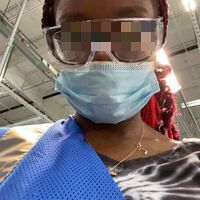
2020-04-20
This image is of me working at a refrigerator plant during the Spring of 2021. Before I started working at my law firm, I bounced around and did odd jobs to make ends meet. I came across this plant job in my hometown because the plant was suffering from severe labor shortages due to COVID-19. The plant was offering higher pay due to labor shortages and was offering to hire in employees faster because of it. We were required to wear mask inside the plant at all times regardless of it being extremely hot and were expected to do overtime and come in on weekends if needed. I did not only want to highlight the work conditions of this job but illuminate businesses began to operate due to the dire conditions of the pandemic. I also wanted to highlight how some people had to continue to work during the pandemic despite setbacks with workers, production numbers, and work conditions. It is important to illuminate stories like these because many essential workers stories are not heard and recognized. Despite unemployment numbers being at all-time high nationally, people are still working. Therefore, it is important to recognize the sacrifices and contributions workers like I had to make in order to continue to support ourselves and our loved ones.
-
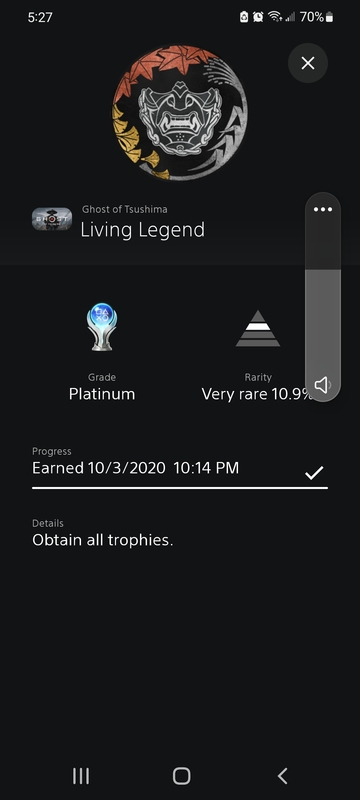
2020-10-03
This is a picture of the platinum I received for beating the game Ghost of Tsushima on October 3rd, 2020. This game came out on July 17th, 2020 and it became my Game of the Year. This was also the year of COVID-19, so I had a lot more free time to play the game and beat it in several months. The pandemic was a difficult time and I just wanted something fun to play. I wanted to forget everything happening in the real world with the pandemic and other problems by jumping back to 13th Century Japan.
The game is set on Tsushima Island as the Mongol Empire took its first step toward invading Japan. Ghost of Tsushima is a beautiful, but a brutal game that I had so much fun with. The soundtrack is beautiful and there were foxes to pet! My main character shifted from a samurai who followed the strict Bushido code into a brutal assassin in desperate times. I can relate to this idea of shifting between jobs because I had to shift my job around to adjust to the desperate times I was experiencing. I had to shift from working in person to working online. I wanted to add this to the collection because I want to show how I could escape the reality of COVID-19 and have some fun.
-
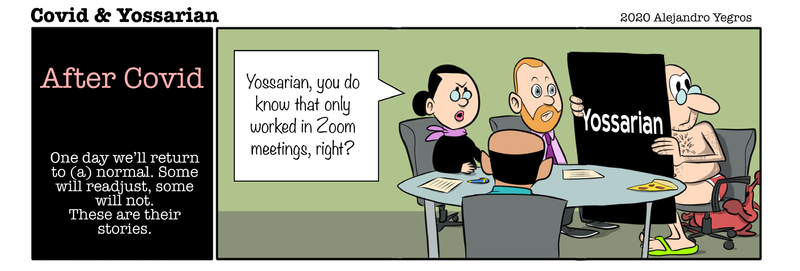
2020-05-21
Covid and Yossarian Episode 65, A comic strip about Covid-19
-
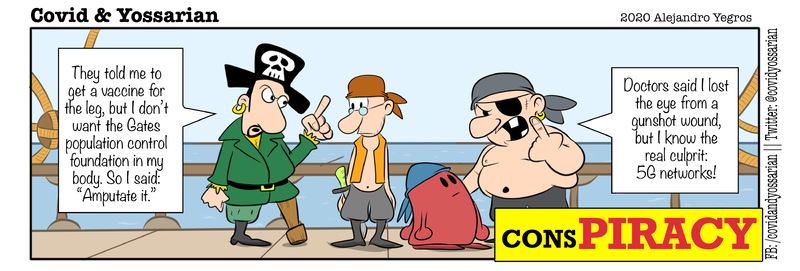
05/20/2020
A comic strip about Covid-19
-
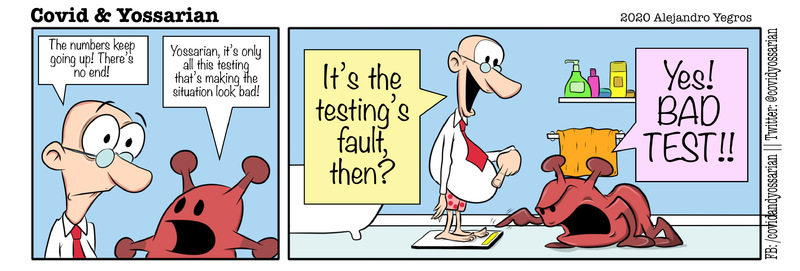
2020-05-19
Covid and Yossarian Episode 63, A comic strip about Covid-19
-
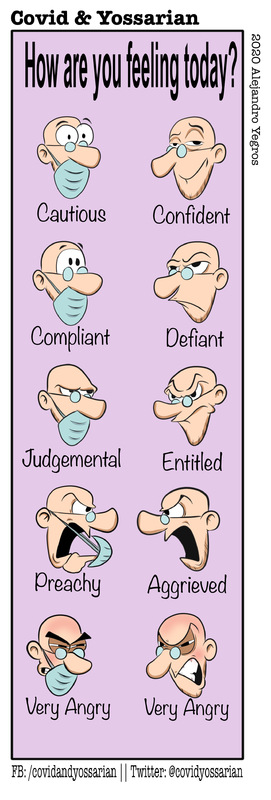
2020-05-18
A comic strip about Covid-19
-
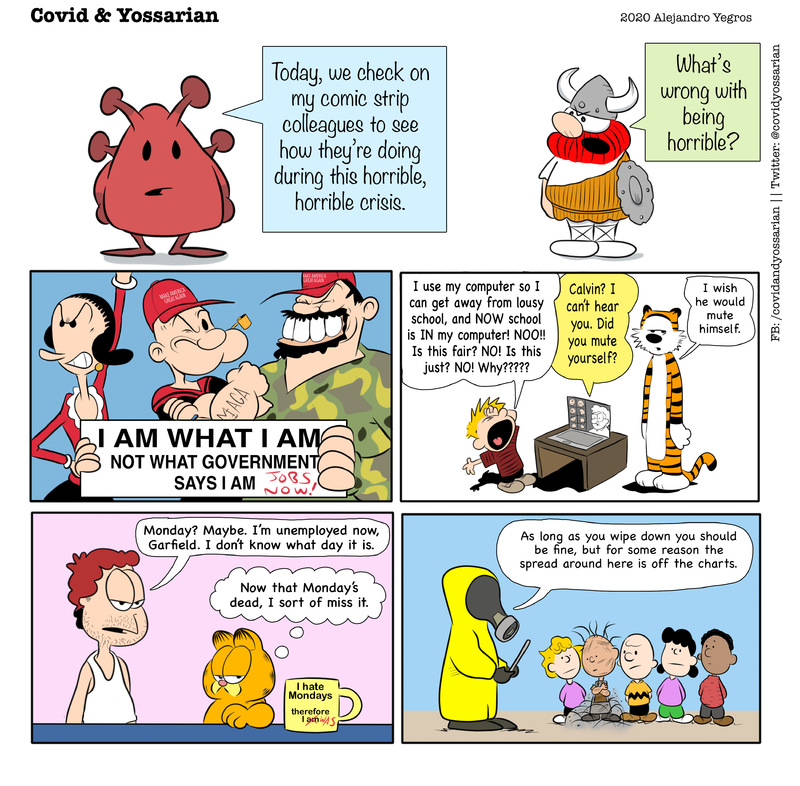
2020-05-17
A comic strip about Covid-19
-
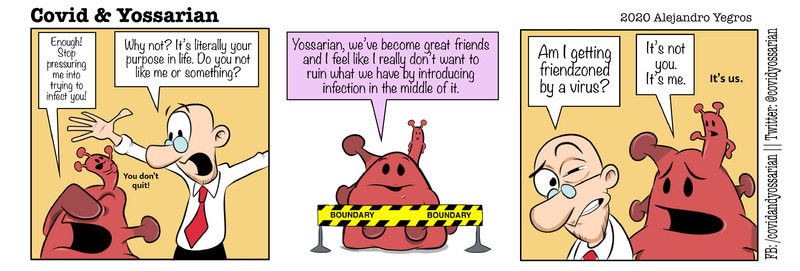
2020-05-16
Covid and Yossarian Episode 60, A comic strip about Covid-19
-
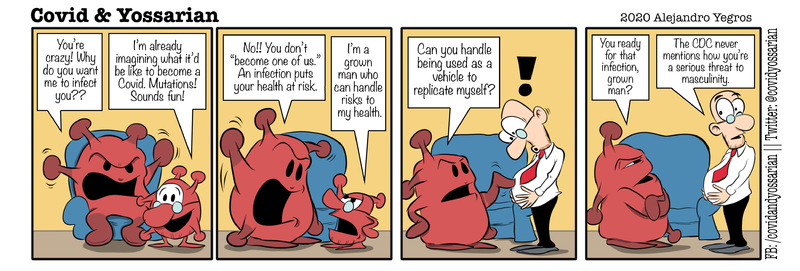
2020-05-15
A comic strip about Covid-19
-
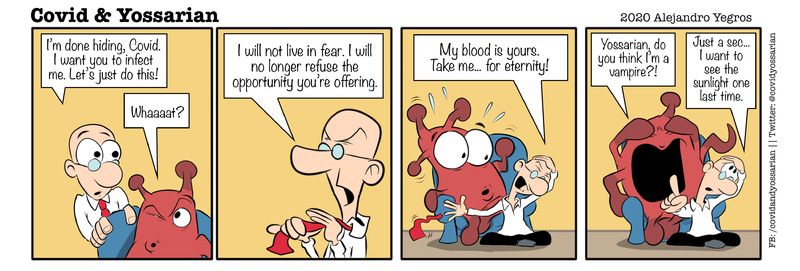
2020-05-14
Covid and Yossarian Episode 58, A comic strip about Covid-19
-
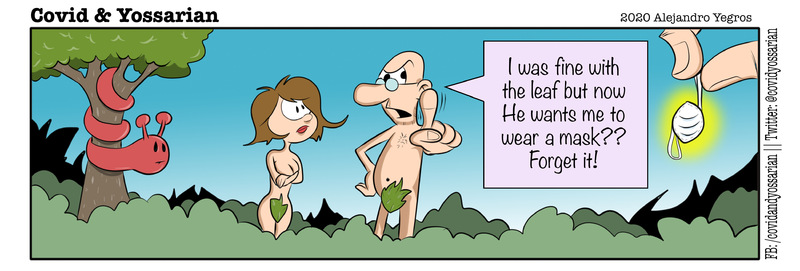
2020-05-13
A comic strip about Covid-19
-
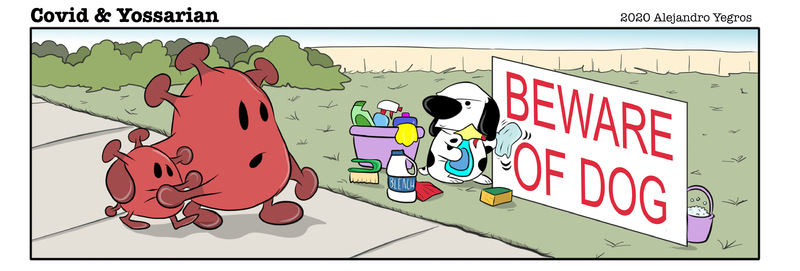
2020-05-12
A comic strip about Covid-19
-
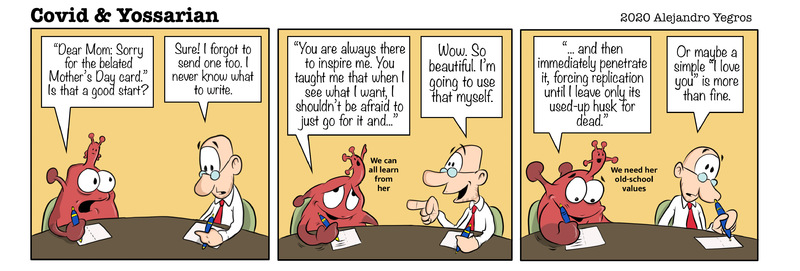
2020-05-11
A comic strip about Covid-19
-
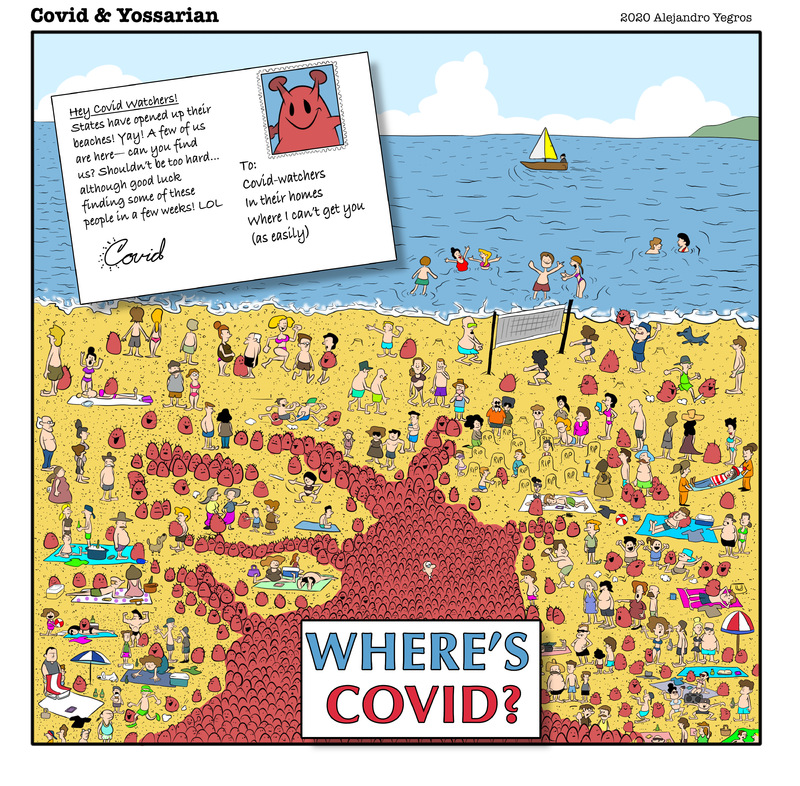
2020-05-10
A comic strip about Covid-19
-
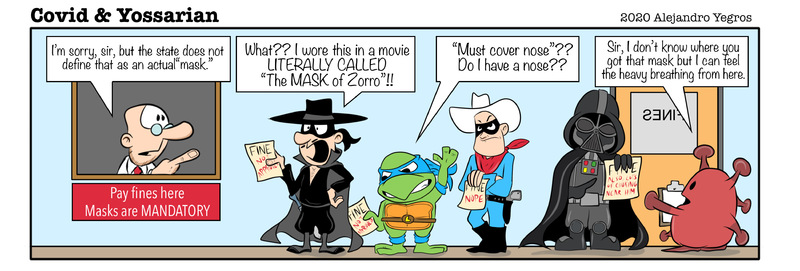
2020-05-09
A comic strip about Covid-19
-
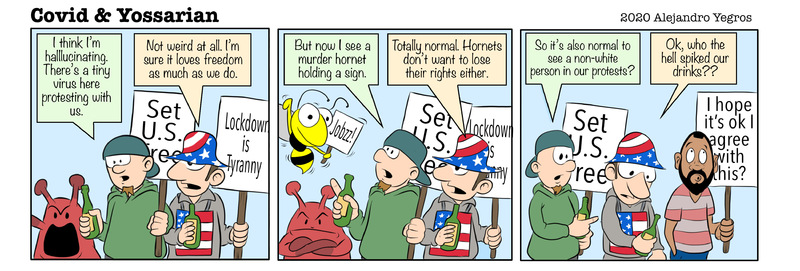
2020-05-08
A comic strip about Covid-19
-
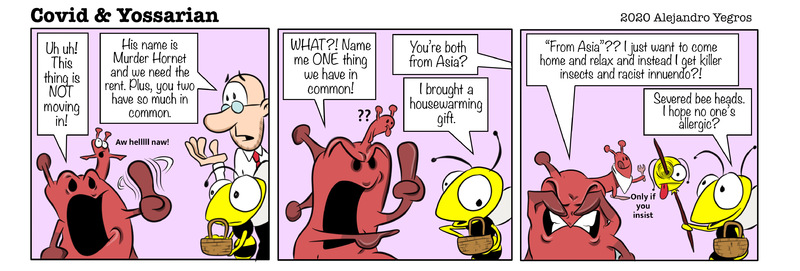
2020-05-07
A comic strip about Covid-19
-
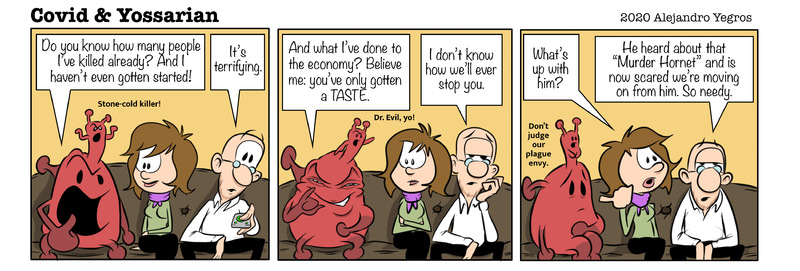
2020-05-06
A comic strip about Covid-19
-
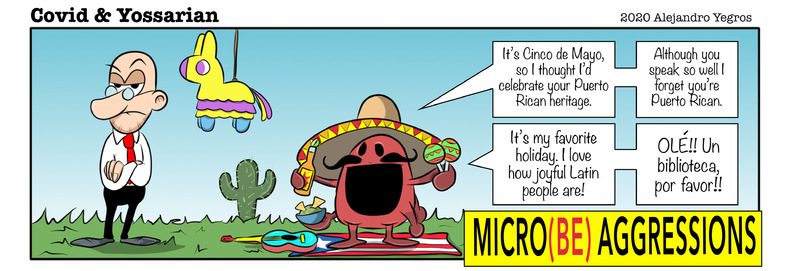
2020-05-05
A comic strip about Covid-19
-
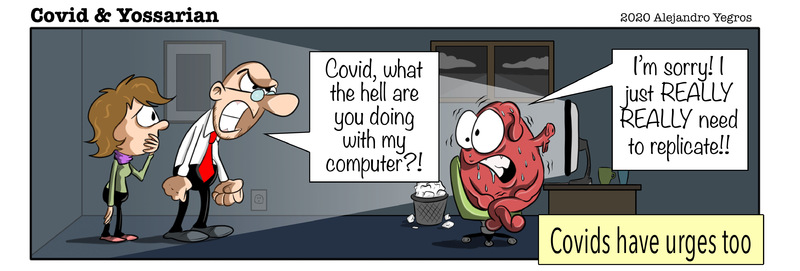
2020-05-04
A comic strip about Covid-19
-
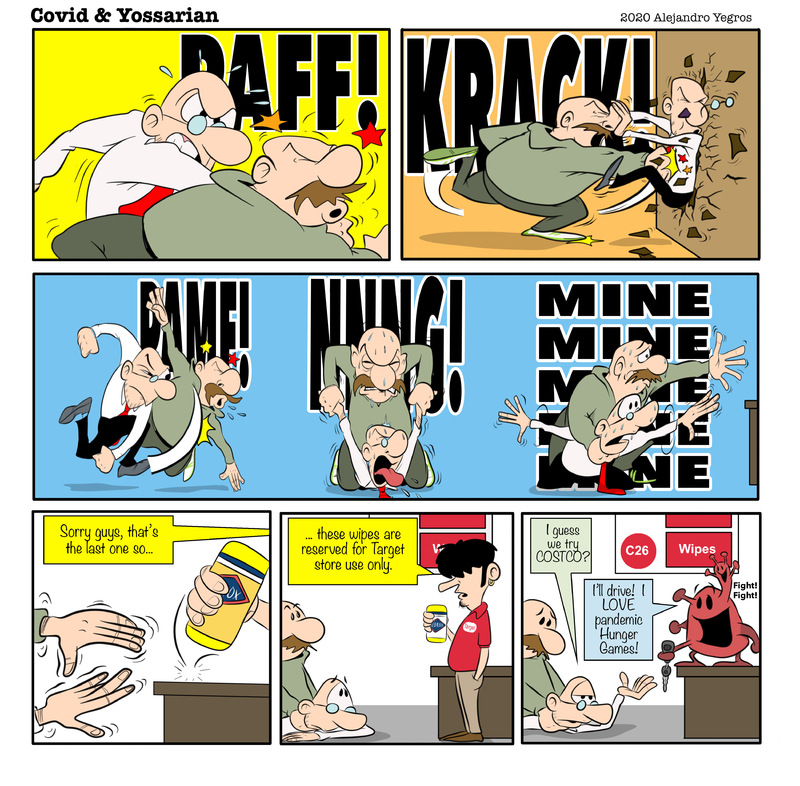
May 03, 2020
A comic strip about Covid-19
-
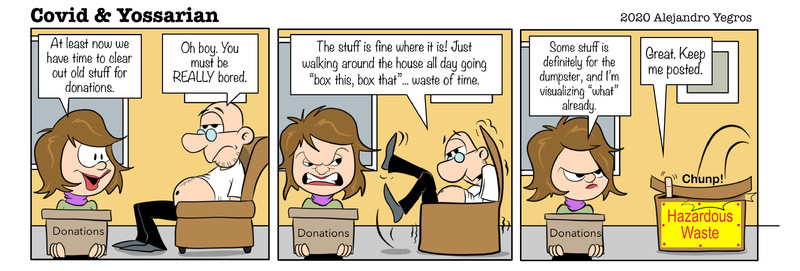
2020-05-02
A comic strip about Covid-19
-
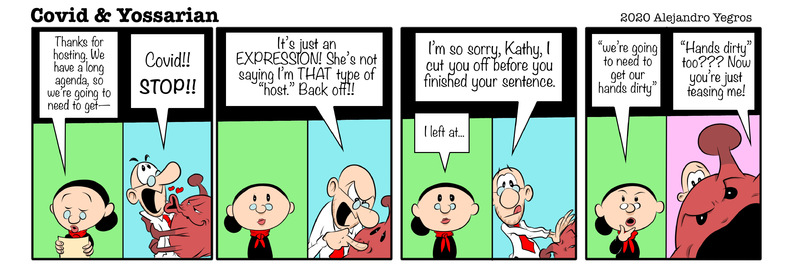
2020-05-01
A comic strip about Covid-19
-
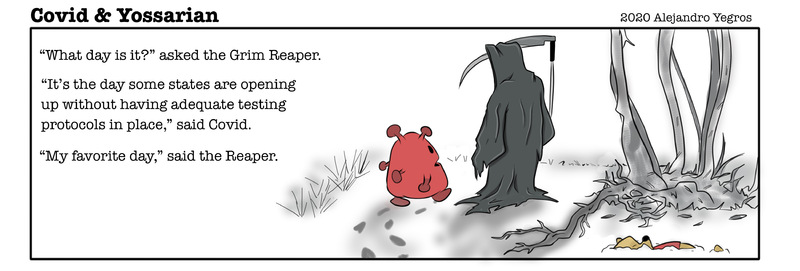
2020-04-30
A comic strip about Covid-19
-
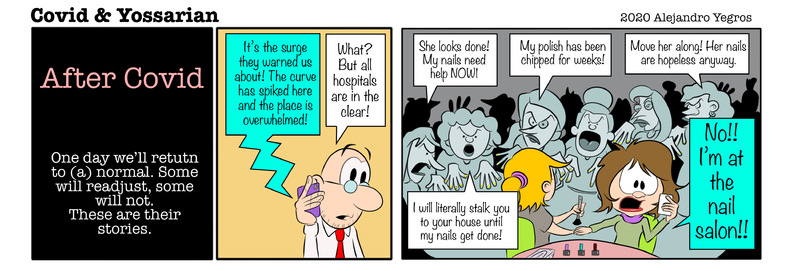
2020-04-29
A comic strip about Covid-19
-
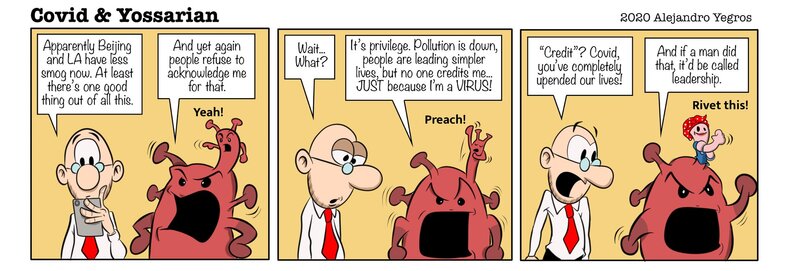
2020-04-28
A comic strip about Covid-19
-
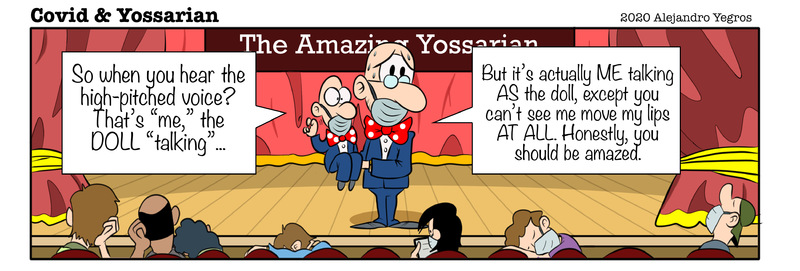
2020-04-27
A comic strip about Covid-19
-
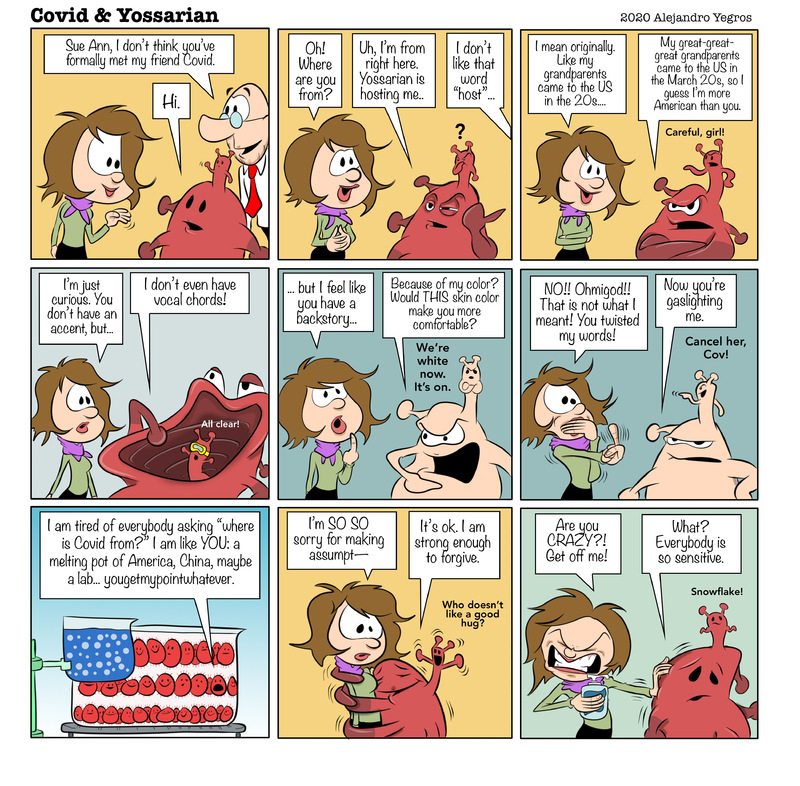
2020-04-26
Covid and Yossarian Episode 40, A comic strip about Covid-19
-
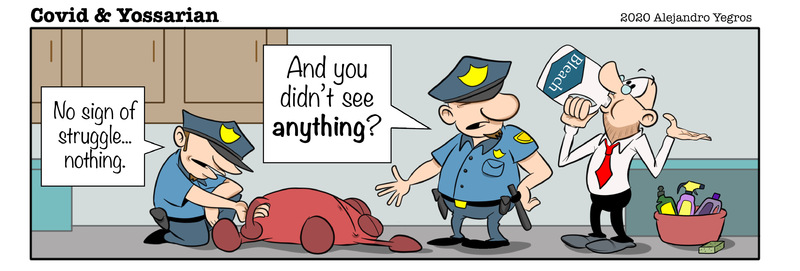
2020-04-25
A comic strip about Covid-19
-
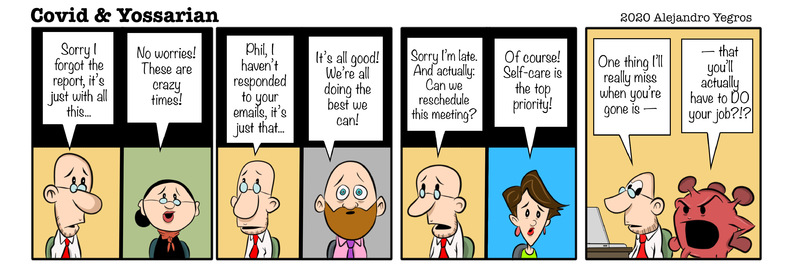
2020-04-24
A comic strip about Covid-19
-
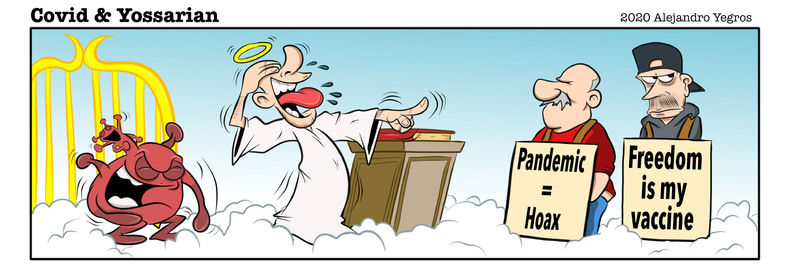
2020-04-23
A comic strip about Covid-19
-
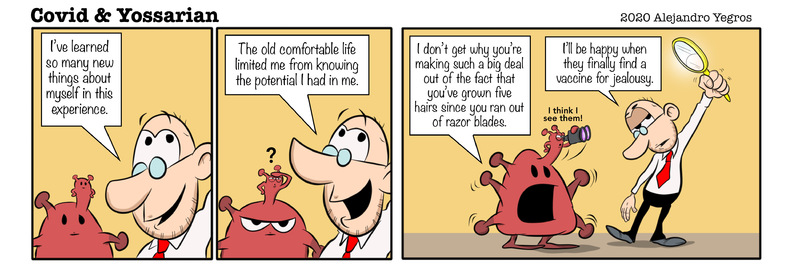
2020-04-21
A comic strip about Covid-19
-
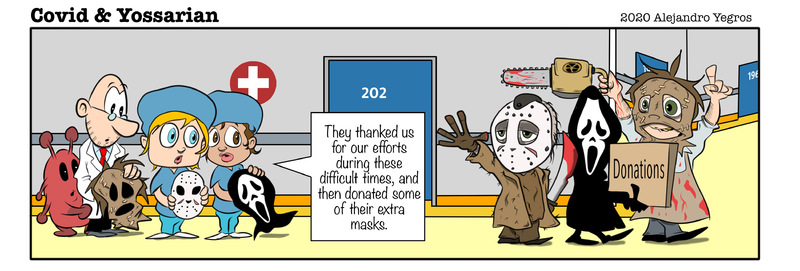
2020-04-21
A comic strip about Covid-19
-
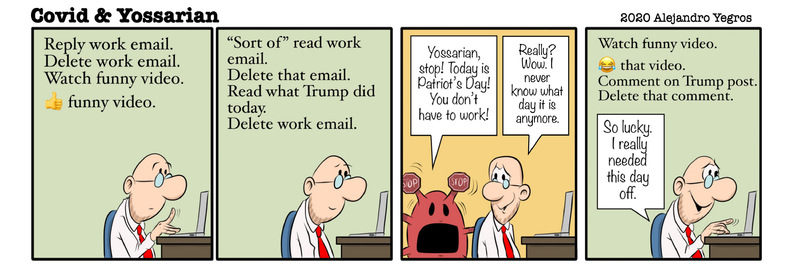
2020-04-20
Covid and Yossarian Episode 34, A comic strip about Covid-19
-
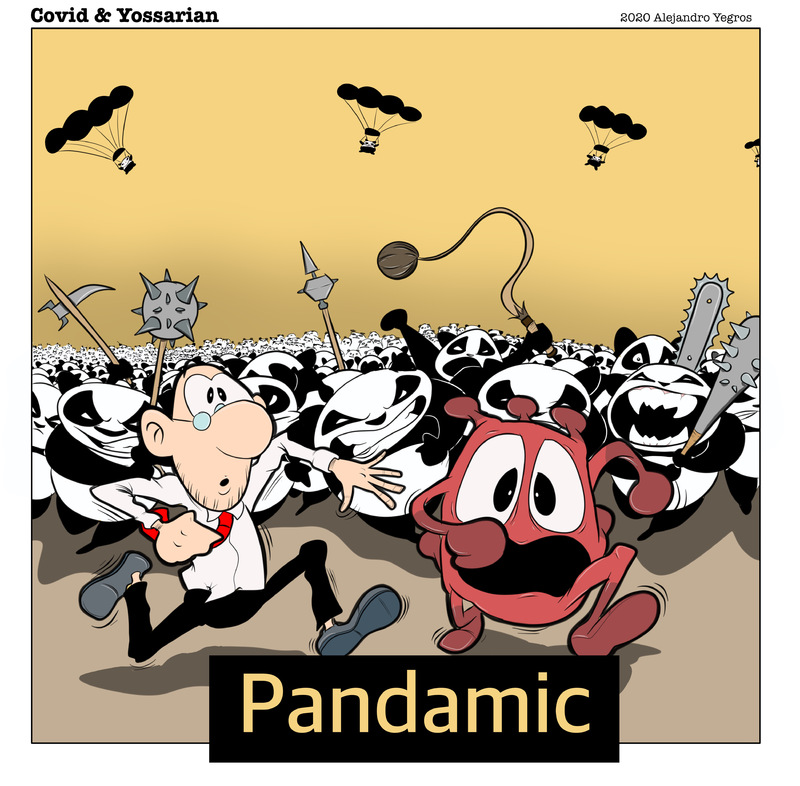
2020-04-19
A comic strip about Covid-19
-
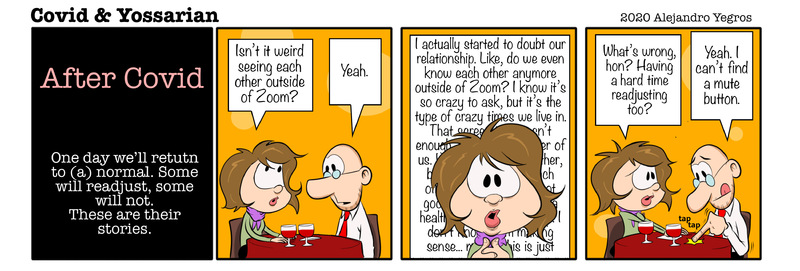
2020-04-18
A comic strip about Covid-19
-
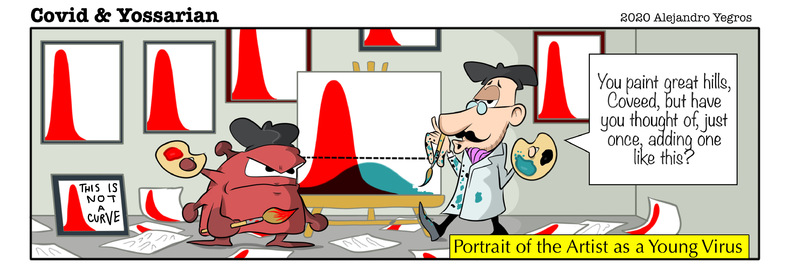
2020-04-17
A comic strip about Covid-19
-
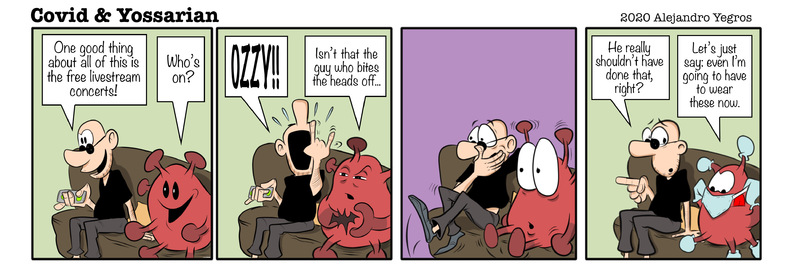
04/16/2020
A comic strip about Covid-19
 2020-08-14
2020-08-14 2022-04-01
2022-04-01 2022-03-23
2022-03-23 2021-04-08
2021-04-08 2020-12-14
2020-12-14 2020-12-10
2020-12-10 2022-04-01
2022-04-01 2020-12-25
2020-12-25 2022-04-03
2022-04-03 2022-03-26
2022-03-26 2022-03-30
2022-03-30 2022-01-14
2022-01-14 2020-04-20
2020-04-20 2020-10-03
2020-10-03 2020-05-21
2020-05-21 05/20/2020
05/20/2020 2020-05-19
2020-05-19 2020-05-18
2020-05-18 2020-05-17
2020-05-17 2020-05-16
2020-05-16 2020-05-15
2020-05-15 2020-05-14
2020-05-14 2020-05-13
2020-05-13 2020-05-12
2020-05-12 2020-05-11
2020-05-11 2020-05-10
2020-05-10 2020-05-09
2020-05-09 2020-05-08
2020-05-08 2020-05-07
2020-05-07 2020-05-06
2020-05-06 2020-05-05
2020-05-05 2020-05-04
2020-05-04 May 03, 2020
May 03, 2020 2020-05-02
2020-05-02 2020-05-01
2020-05-01 2020-04-30
2020-04-30 2020-04-29
2020-04-29 2020-04-28
2020-04-28 2020-04-27
2020-04-27 2020-04-26
2020-04-26 2020-04-25
2020-04-25 2020-04-24
2020-04-24 2020-04-23
2020-04-23 2020-04-21
2020-04-21 2020-04-21
2020-04-21 2020-04-20
2020-04-20 2020-04-19
2020-04-19 2020-04-18
2020-04-18 2020-04-17
2020-04-17 04/16/2020
04/16/2020